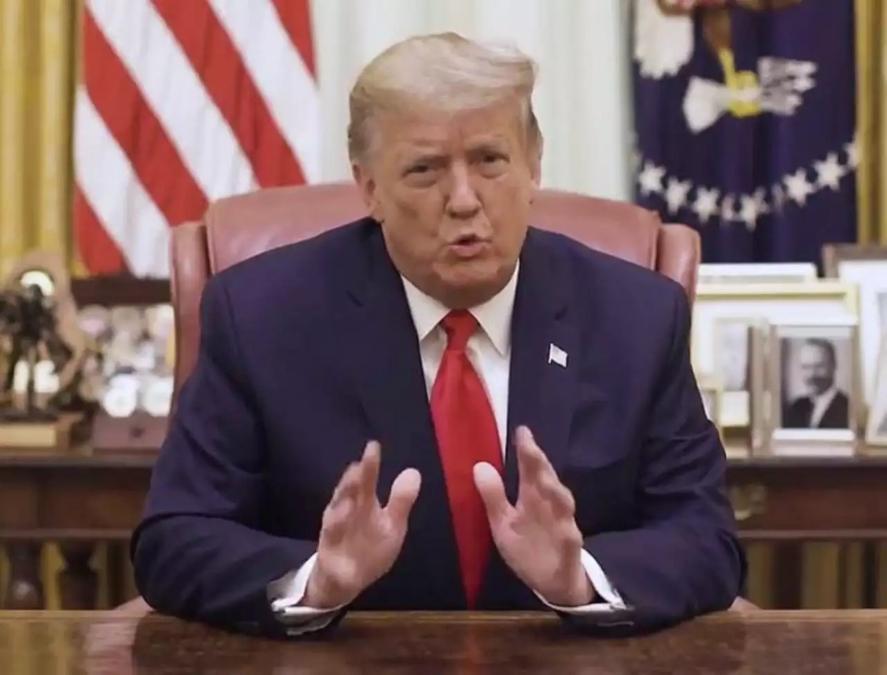A legal analysis article asserting that Donald Trump is automatically disqualified from seeking elected office is gaining attention primarily due to its authors being two conservative law professors who adhere to originalist principles, namely William Baude and Michael Stokes Paulsen. The core of Baude and Paulsen’s argument lies in their assertion that Trump’s involvement in aiding an “insurrection or rebellion,” as defined in Section 3 of the 14th Amendment, should lead to his exclusion from electoral ballots.
However, there exist two notable issues with the idea that state election authorities can and should prevent Trump from appearing on the ballot.
Firstly, while Baude and Paulsen’s adherence to originalism is sincere and diligent, originalist thinkers outside of academic settings tend to veer away from applying originalist principles if they yield outcomes contrary to their conservative stances. Secondly, there is historical precedent that contradicts their argument, a precedent that the scholars dismiss on the grounds that it contradicts the initial intent of Section 3.
In brief, their central points emphasize that during the drafting of the 14th Amendment post-Civil War, the original intent of Section 3 was to disqualify anyone who had previously held public office and subsequently rebelled against the U.S. government, unless two-thirds of Congress made an exception. This constitutional provision is self-executing and necessitates no additional action by Congress for its implementation, as outlined in the article. While courts have the capacity and responsibility to apply this provision, there is no requirement to await their adjudication. Any government official, whether at the state or federal level, who is tasked with upholding the Constitution must adhere to Section 3. Consequently, Baude and Paulsen argue that state officials responsible for configuring primary and general election ballots should exclude Trump. Should he choose to contest this in a legal setting, he retains that option. However, there’s no necessity for officials to defer their actions until a judicial verdict is reached.
Yet, articulating this argument highlights its potential non-adoption by state officials. Was the January 6th attack on the Capitol truly an “insurrection”? Did Trump actively participate or provide assistance to the “enemies” of the Constitution as specified in Section 3? These inquiries delve into contentious matters of constitutional interpretation.
Granted, all state and federal officials pledge to uphold the Constitution. However, contemporary practice has accustomed us to relying on the judiciary, particularly the Supreme Court, to address intricate constitutional queries.
A state election official who decides to prevent Trump’s presence on the ballot would understandably experience considerable apprehension about making such a monumental choice without judicial guidance. Even if local officials were inclined to bar Trump, it would be inadvisable to do so from the perspective of constitutional law.
The Supreme Court as an entity has never directly interpreted Section 3. Nevertheless, in 1869, the Chief Justice of the United States, Salmon P. Chase, issued an opinion in Griffin’s Case through a circuit court interpretation of Section 3. (At that time, it was customary for Supreme Court justices to also serve as circuit court judges.) Chase’s perspective held that Section 3 was not inherently self-enforcing; its enforcement depended on Congress enacting legislation to facilitate implementation. Presently, no such legislation exists.
A circuit court’s decision, even if authored by a sitting Chief Justice, does not officially bind the judiciary or other appellate courts. Nonetheless, this opinion remains the most pivotal precedent in interpreting Section 3. Neither the Supreme Court nor other appellate courts have seriously contested it since its establishment over 150 years ago. Disregarding it would be a display of legal negligence, as it still holds legal weight.
Admittedly, Chase’s reasoning in Griffin’s Case is somewhat convoluted, as evidenced by Baude and Paulsen’s article spanning about 20 pages. Chase seemingly aimed to achieve immediate legal objectives (upholding convictions of judges with Confederate affiliations who might have been disqualified by Section 3). Additionally, he may have held a broader political goal: granting Congress the power to determine whether Section 3 should be applied, without requiring a two-thirds majority to lift the office disqualification.
However, nearly every significant judicial opinion reflects legal and political judgments. Precedent functions under the premise that it remains valid until challenged by the courts.
Originalists tend to disagree with this notion. In fact, they generally view precedent with skepticism, as they believe that the original intent of a law holds greater legitimacy than subsequent interpretations by judges. This stance is one of the shortcomings of originalism. While theoretically intended to limit the judiciary, originalism often allows judges, and others, to disrupt established legal norms in favor of their preferred policy stances, masked as interpretations of original intent. The case of Dobbs v. Jackson illustrates this, as originalists could argue that the right to choose wasn’t originally encompassed by the due process clause, notwithstanding decades of prior precedent suggesting otherwise.
In conclusion, the scholars’ article highlights the flaws of originalism, both in theory and application. Donald Trump’s unsuitability for the presidency is apparent. However, the responsibility to prevent his candidacy rests with the voters. Past rhetoric alone cannot rescue us from this predicament.


